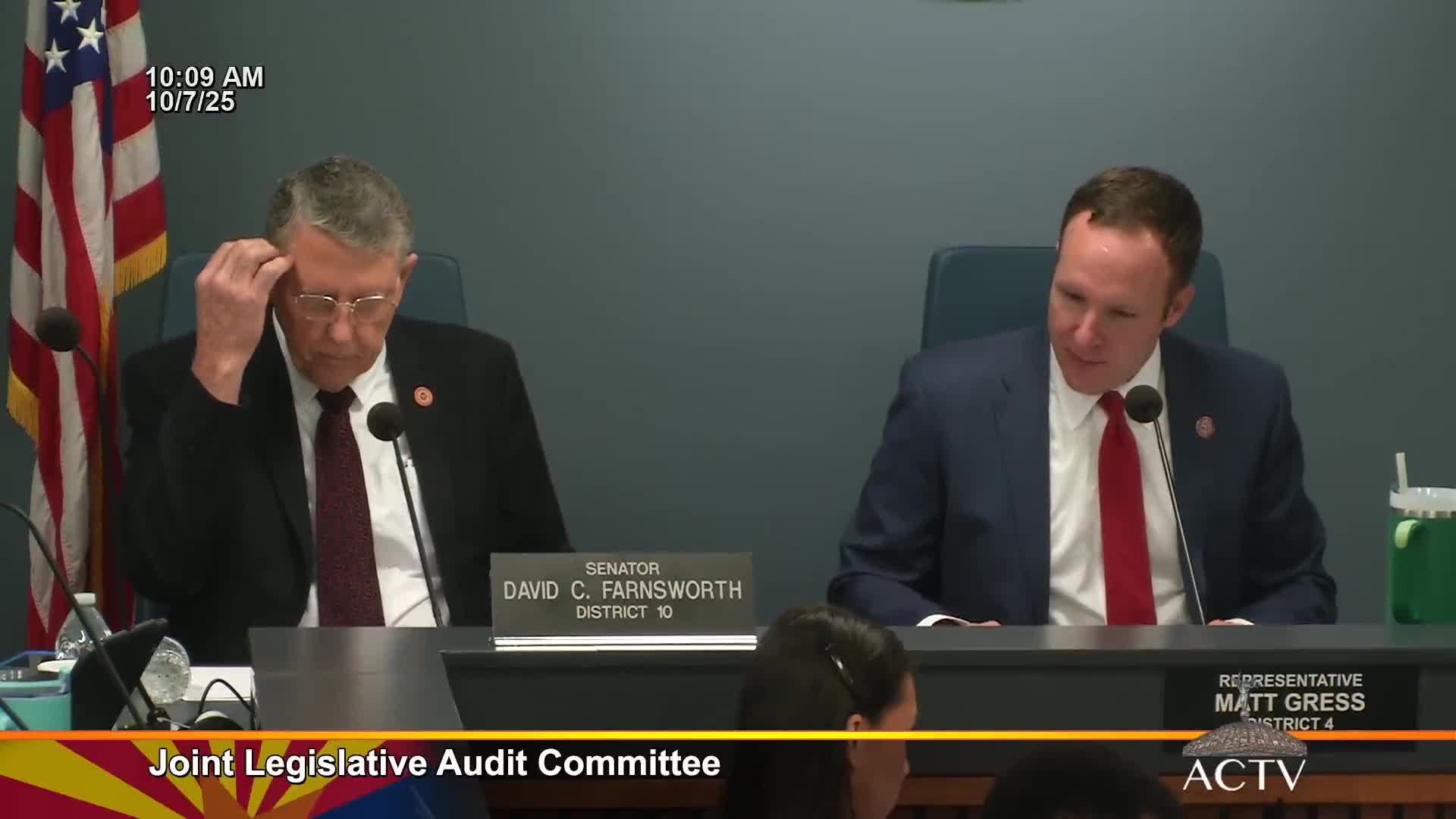JLAC orders special audit of Tolleson Union High School District after public testimony alleging financial opacity, conflicts and safety lapses
Get AI-powered insights, summaries, and transcripts
Subscribe
Summary
The Joint Legislative Audit Committee voted 9–0 (one not voting) to authorize a broad special audit of the Tolleson Union High School District following public testimony alleging opaque transfers, questionable bond language, possible conflicts of interest, contract spending and school‑safety concerns including a reported gun incident.
The Joint Legislative Audit Committee voted unanimously on a roll call to direct the Office of the Auditor General to conduct a special audit of the Tolleson Union High School District. The motion calls for a comprehensive review of the district’s policies and practices on conflicts of interest, procurement, leasing and bond activity, transparency and public access to records, curriculum adoption and student proficiency monitoring, school safety and related uses of School Safety Grant funds.
The motion — approved by a roll call the hearing recorded as 9 ayes, 0 nays and 1 not voting — follows more than an hour of public testimony and committee discussion that included allegations from Citizens for School Accountability and detailed statements from a former Tolleson principal about financial decisions, contracting and student‑safety incidents.
“What happened to the $26,996,096 of the $55,023,242 remaining after the Isaac transfer?” Dave Briggs, a representative of Citizens for School Accountability, asked the committee in prepared remarks describing what he called opaque transfers and unexplained changes in the district’s budgeting and capital accounts.
Briggs summarized public documents and budget tables and told the committee that the district’s surplus figures in maintenance and operations (M&O) and capital accounts, a large transfer labeled as an Isaac lease buy‑back, and subsequent carried‑forward balances raised questions that he said merited a forensic audit. He also cited concerns about bond language, which Briggs said has been broad in successive bond packages and did not identify specific projects voters approved.
Felipe Manraga, a former Tolleson principal who resigned and later addressed the committee, gave detailed testimony alleging a “toxic work environment” under Superintendent Jeremy Kai(s) (transcript spelling varies) and raising specific examples that the auditors will be asked to review. Manraga alleged that district leaders discussed “recolor[ing] money” to move funds between capital and M&O lines, that district priorities shifted from site‑level needs to a new multistory district office and a large domed stadium concept, and that an alleged student gun incident was handled in a way he considers unsafe.
“I made the decision to contact the student's guardian and let them know the allegations … we immediately moved to pull the student from class,” Manraga testified about a reported incident he said occurred while he was principal. Manraga said district leadership later instructed staff to return the student to class unless the student admitted to bringing a gun, and he told the committee that, months later, the same student was involved in a shooting and was taken into custody.
Other allegations raised during public testimony and by committee speakers included: - Large transfers from M&O to capital and questionably described carry‑forwards and lease transactions (Briggs and Manraga). - Potential conflicts of interest: Briggs noted that the firm DLR Group was hired to design a new school and that Carmen Wyckoff, chair of the State School Facilities Board in the example Briggs cited, is an architect with DLR (Briggs). - Contracting and consultant spending: Manraga said the district paid roughly $1 million to WestEd for curricular review work and spent $80,000 to hire a motivational speaker; he questioned whether those procurements produced usable outcomes for classroom instruction. - Curriculum and outcomes: Testimony cited low proficiency rates — English about 26% and math about 22% — and asked whether increased teacher pay in Tolleson has translated into improved proficiency (Briggs and Manraga). - Bond language and voter notice: Witnesses said bond language has been broad and repeated across multiple bond elections and that voters were not given project‑level specificity (Briggs). - Personnel and reporting: Manraga alleged a staff member sent an explicit message and that, after district HR involvement, the staffer was escorted off campus but the district did not file a police report or submit the matter to the state education authorities; Manraga said the staffer was later able to obtain a job at a neighboring district.
Auditor General Lindsay Perry explained to members that the office can access both public and confidential district records under statute and that the special audit request allows up to 15 months for the work. Perry said the office’s school‑audit schedule is about three months behind because of follow‑up work and other special audits and that adding substantial Tolleson work will likely shift other reports by up to about six months.
“We received a legislative request to assess the district’s policies, procedures, processes and practices for disclosing and managing conflicts of interest, secondary employment, fringe benefits, and prohibitions on gifts of public monies,” Perry told the committee, summarizing the written request. She added that JLAC can require the district to provide all records her staff deems necessary for the audit.
The roll call vote to authorize the Tolleson special audit was 9 ayes, 0 nays and 1 not voting; members who spoke in favor cited the volume and seriousness of concerns raised by community members and former employees and said the audit will help the district and the public get definitive answers.
Ending: The auditor general’s office will begin the special audit work if JLAC’s direction is transmitted; the motion sets a reporting deadline of Jan. 30, 2027 in the motion text. Committee members said they expect the audit to examine the budget transfers, contracts, procurement practices, school safety responses and whether governance and disclosure policies were followed.
